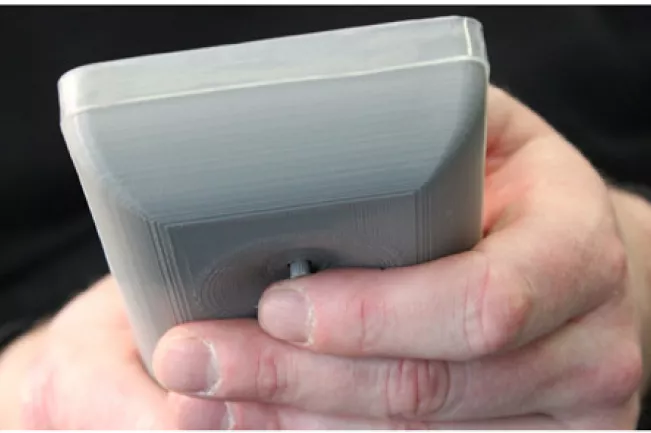Graduate Institute
Doktorwürde für Jens Maiero

In seiner Arbeit erforschte Jens Maiero, wie sich die Interaktion mit Touchscreens, in virtuellen Welten und Telepräsenz-Szenarien unter der Hinzunahme von haptischen Benutzerschnittstellen verändert - speziell wurden die Parameter Performance und Wahrnehmung untersucht. Unter anderem konnte gezeigt werden, dass die räumliche Präsenz in Telepräsenz- Szenarien gesteigert werden kann und auch, dass die Interaktion mit Touchscreens effizienter gestaltet werden kann.
Corona-bedingt wurde die Verteidigung virtuell absolviert. Die Promotion wurde in Kooperation mit der Brunel Universität abgeschlossen und von Prof. André Hinkenjann, Prof. Dr. Ernst Kruijff (H-BRS) und Prof. Dr. George Ghinea (Brunel University, UK) betreut. Die Verteidigung wurde von Prof. Dr. Stephen Brewster (University of Glasgow, Scotland) und Dr. Arthur Money (Brunel University, UK) durchgeführt.
Über Jens Maiero
Als wissenschaftlicher Mitarbeiter des Fachbereichs Informatik und des Instituts für Visual Computing war Jens Maiero in mehreren Forschungsprojekten aktiv. Nach seiner Schreinerlehre studierte er erfolgreich Mathematik an der Hochschule für Technik in Stuttgart und kam für seinen Masterabschluss in Informatik an die Hochschule Bonn-Rhein-Sieg. Die Promotion wurde durch ein Promotionsstipendium des Fachbereichs Informatik unterstützt. Während seiner Zeit als Promotionsstudent forschte Jens Maiero unter anderem in Vancouver (Kanada) an der Simon Fraser Universität, in Nara (Japan) am Nara Institute for Science and Technology und in New York an der Columbia University. Seine Forschungsergebnisse präsentierte er unter anderem in Hong Kong, Shenzen und Turin.
Jens Maiero bleibt der Hochschule als Post-Doc erhalten und er wird die Leitung eines hochschulübergreifenden Forschungsprojekts übernehmen, in dem es um virtuelle Realität in der digitalen Hochschullehre geht.
Abstract der Arbeit
This thesis explores novel haptic user interfaces for touchscreens, virtual and remote environments (VE and RE). All feedback modalities have been designed to study performance and perception while focusing on integrating an additional sensory channel - the sense of touch. Related work has shown that tactile stimuli can increase performance and usability when interacting with a touchscreen. It was also shown that perceptual aspects in virtual environments could be improved by haptic feedback. Motivated by previous findings, this thesis examines the versatility of haptic feedback approaches. For this purpose, five haptic interfaces from two application areas are presented. Research methods from prototyping and experimental design are discussed and applied. These methods are used to create and evaluate the interfaces; therefore, seven experiments have been performed. All five prototypes use a unique feedback approach. While three haptic user interfaces designed for touchscreen interaction address the fingers, two interfaces developed for VE and RE target the feet. Within touchscreen interaction, an actuated touchscreen is presented, and study shows the limits and perceptibility of geometric shapes. The combination of elastic materials and a touchscreen is examined with the second interface. A psychophysical study has been conducted to highlight the potentials of the interface. The back of a smartphone is used for haptic feedback in the third prototype. Besides a psychophysical study, it is found that the touch accuracy could be increased. Interfaces presented in the second application area also highlight the versatility of haptic feedback. The sides of the feet are stimulated in the first prototype. They are used to provide proximity information of remote environments sensed by a telepresence robot. In a study, it was found that spatial awareness could be increased. Finally, the soles of the feet are stimulated. A designed foot platform that provides several feedback modalities shows that self-motion perception can be increased.
Kontakt

André Hinkenjann
Founding director of the Institute of Visual Computing, Research Professor Computer Graphics and Interactive Environments
Research fields
Location
Sankt Augustin
Room
C 167
Address
Grantham-Allee 20
53757, Sankt Augustin
Telephone
+49 2241 865 229
Ernst Kruijff
Professor for Human Computer Interaction, Co-Director Institute of Visual Computing (IVC)
Location
Sankt Augustin
Room
C 273
Address
Grantham-Allee 20
53757, Sankt Augustin
Telephone
+49 2241 865 9616
Miriam Lüdtke-Handjery
M.Sc. M.A., Graduate Institute: Scientific Advisor, Department of Computer Science: Project Cyber Campus NRW
Location
Sankt Augustin
Room
F 423
Address
Grantham-Allee 20
53757, Sankt Augustin
Telephone
+49 2241 865 704